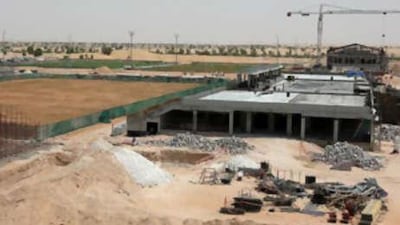DUBAI // Some rugby players and fans in Dubai are concerned that the sport's new stadium is too far out of town to sustain the game's popularity. The new facility, named The Sevens, is expected to be finished in time to host the Emirates Airline Dubai Rugby Sevens in November. However its location, off junction 29 of the Dubai-Al Ain motorway, about 60km from The Palm Jumeirah, is a long journey for most rugby players in the city, many of whom are still unhappy over the loss of Dubai Exiles Rugby Ground, the game's former home. While the stands and clubhouse buildings at The Sevens are still some way from completion, grass has been laid on one of the pitches at the new ground. The Sevens, which is owned and operated by Emirates Airline, will host five club matches every Friday. Sheds dot the complex - which was once part of a camel farm - and are serving as temporary changing rooms, toilets and a club bar. Some members of Dubai's rugby community have issued dire predictions that some clubs could be forced to close after the relocation from the Exiles Rugby Ground, in Al Awir, which has been consumed by the Meydan racetrack project. However, rugby bosses played down the concerns. Gary Chapman, the president of Group Services and Dnata, Emirates Group, is overseeing the construction of the new venue. He said: "I've heard comments. It is actually a 15-minute drive from the old Exiles site at the end of The Creek. "If you look at the development out here, in five years time this will be a completely different place. Dubailand is just across the road. The Tiger Woods Golf Course is 2km down the road. It won't be long before there is a community out here, living around this facility." Rather than hindering growth, Mr Chapman believes the Arabian Gulf Rugby Football Union (AGRFU) now has greater scope for developing the sport. "It gives us the opportunity to develop the game regionally and in Dubai," he said. "We know traditionally the expatriate community is a strong follower of rugby. But this will give us the ability to develop the game among Arab nationals and other communities, and to really put some emphasis on that. It is win-win all round." However, some people in the local rugby fraternity are not so enthused. Armel van Erck, who is the hooker for the Dubai Frogs, who play in the second tier of Gulf competition, fears his team may have to disband after the move. "When we had the transfer to the new club, it was quite difficult for everyone to get to," said Mr van Erck. "Our club mainly consists of young French players here on internships. They don't all have cars and it is difficult for them. There was definitely a time when the future of the club was in the balance, but that has fortunately abated now. "Now I have changed my tune slightly because more people have been coming to training. What I do find deplorable was the loss of heritage with the move from the Exiles." Andy Jones stepped down as coach of the Dubai Dragons this summer after six highly successful seasons, citing the extra travel time as the major reason. "Everyone is busy, amateur, and finish work at 6pm," said the Welshman, who is now the head of physical education at Dubai College, one of the UAE's top rugby schools. "The Dragons started off the year with a bang. There were 45 guys going to training, which was fantastic. Obviously, the more Dubai grows, there will be more and more rugby players. "But there are guys who have played for a long time who are not able to play any more, simply because of work and family commitments. "There is no easy answer. There are no other grass pitches with floodlights in Dubai, so the only option is to go up there. "At the moment, if you want to play rugby, you have to go that far. It is very, very difficult." According to the Dragons captain, James Wellings, most of his squad have remained impressively committed despite the move - and their number has actually grown during pre-season. "One of the big worries of moving out there - not just for us, but for all the Dubai clubs - was getting numbers," said Mr Wellings, a teacher at Wellington International School. "But we have had 60 players per training session. Now the biggest problems we have had have been making sure guys get games, rather than trying to scrabble around for players. That is fantastic." The Dubai Hurricanes, currently the top-ranked team in the Gulf, admit they have not enjoyed quite such a boom as their city rivals. Graham Brown, a publishing manager who plays on the wing for the Hurricanes, said: "Our numbers have dropped off a little bit - but part of that could be down to complacency because we have been winning things." The Hurricanes captain, Chris Gregory, lives in Sharjah, yet has no complaints about travelling even further to play. The new venue has already become a second home for him. In addition to the regular training sessions he has with his club side, Mr Gregory is also part of the Arabian Gulf's sevens and 15-man squads. "I'm looking at it as a positive, but I am down there virtually every day with the Gulf as well," said Mr Gregory. pradley@thenational.ae

Rugby to thrive in Dubai, say bosses
This comes despite warnings from players that a new headquarters is too far out of town to sustain popularity.
Most popular today

